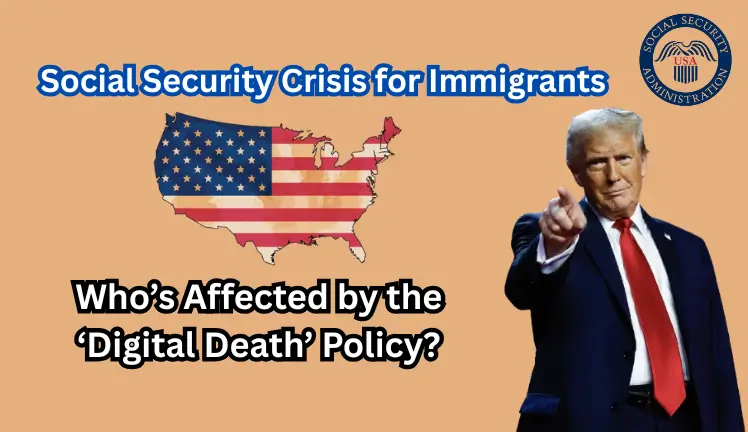Social Security Crisis for Immigrants: Who’s Affected by the ‘Digital Death’ Policy?
A shocking turn of events has pushed over 6,000 legal immigrants into an identity nightmare. The U.S. government has reportedly listed them in the Social Security Administration’s Master Death File, a federal database intended for the deceased—effectively rendering these living individuals “dead” in the eyes of the system.

This so-called “Digital Death” policy is sparking outrage from immigrant rights groups and legal experts, who argue that it strips law-abiding individuals of their rights and access to federal programs, including Social Security benefits, financial services, and healthcare.
What Is the ‘Digital Death’ Policy?
The phrase “digital death” refers to the bureaucratic erasure of legal immigrants from official government systems by marking them as deceased. Though alive and residing legally in the U.S., these individuals have been blocked from using their Social Security Numbers and denied access to essential services.
The move came as part of a broader effort to cancel parole status for certain immigrants—many of whom entered the U.S. under humanitarian or temporary programs. On April 8, 2025, Customs and Border Protection issued formal notices to those impacted, confirming the end of their parole and their transfer to the Master Death File.
Who Is Affected?
Over 6,300 legal immigrants are at the center of this crisis. According to anonymous sources within the Department of Homeland Security, those listed were flagged for alleged links to criminal or national security concerns—but critics say no evidence has been disclosed to support such claims.
In most cases, the individuals had lived peacefully and lawfully under parole programs supported by prior administrations. Now, they face identity loss, legal uncertainty, and blocked access to federal systems.
What Is the Master Death File?
The Master Death File is a historical database maintained by the Social Security Administration. Traditionally, it is used to track deceased individuals and prevent identity fraud. It holds more than 142 million entries dating back to 1899.
However, the current administration has rebranded it as the ‘Master File of Ineligibles,’ signaling a potential shift in its purpose—from death verification to benefit denial. This has led many to believe the true intent is to cut off services to immigrants, regardless of their legal status.
What Are the Consequences?
Being marked as deceased in the SSA system has life-altering consequences:
- Loss of Social Security benefits
- Inability to access banking services
- Blocked from tax filings and refunds
- Denied healthcare and welfare programs
- Damage to credit and employment records
Advocacy groups have called the act “digital assassination”, arguing it is an extreme and dehumanizing policy targeting vulnerable populations.
Legal and Human Rights Reactions
Legal experts say the move may violate constitutional rights, particularly due process protections. Human rights organizations are calling for immediate correction, accountability, and the restoration of identities for those wrongly affected.
Litigation and advocacy efforts are already underway, as calls grow louder to reverse the policy and protect the legal standing of these immigrants.
- Read Also:
- 2025 Social Security Check: How It’s Calculated & What You’ll Actually Get?
- Tax Day 2025 Payment: What to Do If You Can’t Afford Your Tax Bill by April 15
Frequently Asked Questions
Q1. What is the ‘Digital Death’ policy?
It refers to marking legal immigrants as deceased in federal databases, cutting off their access to services.
Q2. Are these immigrants in the country legally?
Yes. Most were admitted under legal parole programs approved by past administrations.
Q3. Why were they marked as deceased?
Authorities claim security concerns but have provided no public evidence to support the decision.
Q4. Can these individuals access Social Security benefits now?
No. Their benefits and access to government programs are frozen due to their “deceased” status.
Q5. Is there legal action happening?
Yes. Lawyers and advocacy groups are pursuing legal remedies to restore their rights and correct the records.
As a finance news writer at sirfal.com, I specialize in breaking down complex economic trends, market updates, and investment strategies into clear, actionable insights. My mission is to empower readers with the knowledge needed to make informed financial decisions. Thank you for engaging with my articles; I hope they add value to your financial journey.